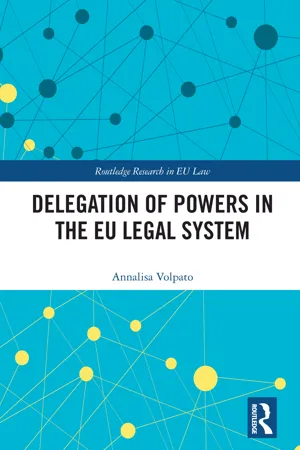
- 304 pages
- English
- ePUB (mobile friendly)
- Available on iOS & Android
Delegation of Powers in the EU Legal System
About This Book
The majority of rules adopted at the EU level are not issued by democratically elected institutions, but rather by administrative bodies which are empowered to exercise rule-making powers by legislative acts. This book analyses the legal mechanism through which these powers are conferred on the most relevant bodies in the EU institutional landscape, namely the European Commission, the Council, the ECB and EU agencies, and the democratic controls in place to limit and oversee the exercise of these powers.
Providing an overarching perspective of the delegation of powers, this book reflects on the notion of delegation and on the commonalities between the different forms of delegation identified. It focuses on the legal requirements and limits for the delegating act, the procedures for the exercise of such powers, the position of the acts in the hierarchy of norms, and their judicial review. Overcoming the fragmentation which characterized the development of the different forms of delegation in the EU, this analysis provides a clear, structured, and coherent picture of the legal framework for the delegation of powers in the light of the constitutional principles of this legal system.
Academics and practitioners will equally appreciate this highly accessible addition to the current debate in legal scholarship of the delegation of powers in the EU, as well as its explanations on comitology and the empowerment of EU agencies.
Frequently asked questions
1 Defining delegation of powers
1. Introduction
2. A short history of the notion of delegation in State legal systems
2.1. The origins of the notion
2.2. The evolution of the notion of delegation in the 20th century
Table of contents
- Cover
- Half Title
- Series
- Title
- Copyright
- Table of Contents
- Abbreviations
- Table of cases
- Table of legislation
- Introduction
- 1 Defining delegation of powers: from State-based models to an EU notion
- 2 Delegations of powers in the EU: development, powers, and features
- 3 Limiting the delegation of powers: the delegating act
- 4 Limiting the delegation of powers: the procedures
- 5 The acts of the delegate and their judicial review
- Conclusions
- Bibliography
- Index